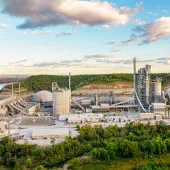
First global building materials company to join Science Based Targets iinitiative ‘Business Ambition for 1.5°C’
LAFARGEHOLCIM have joined the Science Based Targets initiative (SBTi) ‘Business Ambition for 1.5°C’, becoming the first global building materials company to sign the pledge with intermediate targets for 2030, validated by SBTi.
This commitment builds on LafargeHolcim’s leadership in green construction with cutting-edge solutions such as ECOPact, their green concrete, and Susteno, their leading circular cement.
In their 2030 goals, LafargeHolcim are further lowering their target for CO2 intensity in cement to 475kg net CO2 per tonne of cementitious material. Europe is on track to become the first region to reach this net zero ambition, building on its CHF160 million investment roadmap launched last year.
Going one step further, LafargeHolcim are partnering with SBTi to develop a roadmap for aligning climate targets to a 1.5°C future in the cement sector, pushing the boundaries of green construction.
Jan Jenisch, chief executive officer, said: ‘I believe in building a world that works for people and the planet. That’s why we are reinventing how the world builds today to make it greener with low-carbon and circular solutions.
‘I am very excited to be working with SBTi, taking a rigorous science-based approach to shape our net zero roadmap and accelerating our efforts to substantially lower our CO2 footprint. I will not stop pushing the boundaries to lead the way in green construction.’
Magali Anderson, chief sustainability officer, added: ‘As the world’s largest cement producer, we have a key role to play in addressing today’s climate crisis. On our way to becoming a net zero company, we are not only part of the solution, we are committed to supporting our customers in their CO2-reduction ambitions. No company can tackle today’s climate challenge alone, that’s why we are partnering for impact.’
Alberto Carrillo, director of science-based targets at CDP, one of the Science Based Targets initiative partners, said: ‘We at SBTi are delighted that LafargeHolcim have joined the group of over 290 industry leaders committed to a 1.5°C future. As the largest player in one of the most carbon-intensive industries, LafargeHolcim’s leadership demonstrates that a net zero economy is within reach.’
The SBTi has approved LafargeHolcim’s commitment to reduce scope 1 and scope 2 greenhouse gas (GHG) emissions by 21% per tonne of cementitious materials by 2030 from a 2018 base year. With this target, the company commits to reduce scope 1 GHG emissions by 17.5% per tonne of cementitious material and scope 2 GHG emissions by 65% per tonne of cementitious materials within the same time frame.
By 2030, LafargeHolcim will:
- Accelerate the use of low-carbon and carbon-neutral products such as ECOPact and Susteno
- Recycle 100 million tonnes of waste and by-products for energy and raw materials
- Scale up the use of calcined clay and develop novel cements with new binders
- Double waste-derived fuels in production to reach 37% (compared with 2018 baseline)
- Reach 475kg net CO2 per tonne of cementitious material
- Operate their first net zero CO2 cement production facility.
In addition to this pledge to reduce scope 1 and scope 2 emissions, LafargeHolcim will expand their actions across their value chain to include scope 3 emissions. By taking this holistic approach, the company will reduce its transportation and fuel-related emissions by 20%.
Moreover, on their net zero journey, LafargeHolcim will accelerate circular construction by increasing the use of recycled materials in their products and processes while recovering materials at the end of their life cycle.
In 2019 alone, LafargeHolcim recycled 48 million tonnes of waste, making the company one of the world leaders in waste solutions, contributing to cleaner cities while preserving earth’s finite resources.
LafargeHolcim say they will use the coming decade to develop and deploy advanced technologies, preparing the next step of their net zero journey. This will include piloting more than 20 carbon capture, usage and storage (CCUS) projects across Europe and North America.









